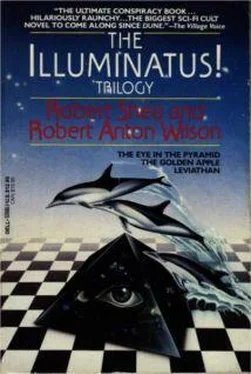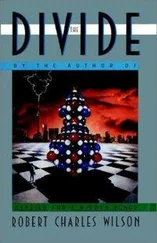Robert Wilson - The Illuminatus! Trilogy
Здесь есть возможность читать онлайн «Robert Wilson - The Illuminatus! Trilogy» весь текст электронной книги совершенно бесплатно (целиком полную версию без сокращений). В некоторых случаях можно слушать аудио, скачать через торрент в формате fb2 и присутствует краткое содержание. Жанр: Триллер, на английском языке. Описание произведения, (предисловие) а так же отзывы посетителей доступны на портале библиотеки ЛибКат.
- Название:The Illuminatus! Trilogy
- Автор:
- Жанр:
- Год:неизвестен
- ISBN:нет данных
- Рейтинг книги:5 / 5. Голосов: 1
-
Избранное:Добавить в избранное
- Отзывы:
-
Ваша оценка:
- 100
- 1
- 2
- 3
- 4
- 5
The Illuminatus! Trilogy: краткое содержание, описание и аннотация
Предлагаем к чтению аннотацию, описание, краткое содержание или предисловие (зависит от того, что написал сам автор книги «The Illuminatus! Trilogy»). Если вы не нашли необходимую информацию о книге — напишите в комментариях, мы постараемся отыскать её.
The Illuminatus! Trilogy — читать онлайн бесплатно полную книгу (весь текст) целиком
Ниже представлен текст книги, разбитый по страницам. Система сохранения места последней прочитанной страницы, позволяет с удобством читать онлайн бесплатно книгу «The Illuminatus! Trilogy», без необходимости каждый раз заново искать на чём Вы остановились. Поставьте закладку, и сможете в любой момент перейти на страницу, на которой закончили чтение.
Интервал:
Закладка:
The novelist paused again, and then began talking about the Golden Dawn Society in England in the 1890s. "Strange things were written by the members. Algernon Blackwood, for instance, wrote of intelligent beings who preexisted mankind on earth. Can you take such a concept seriously? Can you think about Black-wood's warnings, of his guarded phrases, such as, 'Of such great powers or beings there may conceivably be a survival, of which poetry and legend alone caught a flying memory and called them gods, monsters, mythical beings of all sorts and kinds'? Or, Arthur Machen, who wrote of the 'miracles of Mons' during the Great War, describing the angels, as they were called, and published this two days before the soldiers at the scene sent back reports of the incident. Machen was in the Golden Dawn, and he left it to rejoin the Catholic Church, warning, 'There are sacraments of Evil as well as of Good.' William Butler Yeats was a member, too, and you must certainly know his remarkable lines, 'What rough beast/ Its hour come round at last/ Slouches toward Bethlehem to be born?' And the Golden Dawn was just the outer portal of the Mysteries. The things that Crowley learned after leaving the Golden Dawn and joining the Ordo Templi Orientis… Hitler suppressed both the Dawn and the Ordo Templi Orientis, you know. He belonged to the Vril Society himself, where the really extraterrestrial secrets are kept…"
"You seem to be having a hard time getting to the point," Drake said.
"Some things need to be approached in hints, even in allegories. You have taken mescaline with Klee and his friends, and spent the night seeing the Great Visions. Do I need to remind you that reality is not a one-level affair?"
"Very well," Drake said. "Behind the Golden Dawn and the OTO and the Vril Society is a hidden group of real Initiates. There was a German branch of the Golden Dawn, and Hitler was a member. You want me to understand that to treat these sacraments of Evil and these beings from Atlantis as no more than fictions would be to oversimplify; is that right?"
"The Golden Dawn was founded by a German woman, carrying on a tradition that was already a hundred years old in Bavaria. As for these powers or beings from Thule, they do not exist in the sense that bricks and beefsteak exist, either. The physicist, by manipulating these fantastic electrons- which, I remind you, have to be imagined as moving from one place to another without passing through any intervening space like a fairy or a ghost- produces real phenomena, visible to the senses. Say, then, that by manipulating these beings or powers from Thule, certain men are able to produce effects that can also be seen and experienced."
"What was the Golden Dawn?" Drake asked, absorbed. "How did it begin?"
"It's very old, more than medieval. The modern organization began in 1776, with a man who quit the Jesuits because he thought he was an atheist, until his researches into Eastern history had surprising results…"
(It's him! Hitler screamed, He has come for me! And then, as Herman Rauschning recorded, "he lapsed into gibberish." The boss himself, Dutch Schultz moaned, Oh, mama, I can't go through with it. Please. Come on, open the soap duckets. The chimney sweeps. Take to the sword. Shut up. You got a big mouth.)
We've got two real possibilities, Lepke's lawyer reported. But one of them is Boston Irish and what you described was the old original Boston accent. The second one is probably your man, then. His name is Robert Putney Drake.
Standing before the house on Benefit Street, Drake could see, across the town, the peak of Sentinel Hill and the old deserted church that had harbored the Starry Wisdom Sect in the 1870s. He turned back to the door and raised the old Georgian knocker (remembering: Lillibridge the reporter and Blake the painter had both died investigating that sect), then rapped smartly three times.
Howard Phillips Lovecraft, pale, gaunt, cadaverous, opened the door. "Mr. Drake?" he asked genially.
"It was good of you to see me," Drake said.
"Nonsense," Lovecraft replied, ushering him into the Colonial hallway. "Any admirer of my poor tales is always welcome here. They are so few that I could have them all here on a single day without straining my aunt's dinner budget."
He may be one of the most important men alive, Drake thought, and he doesn't really suspect.
("He left Boston by train this morning," the soldier reported to Maldonado and Lepke. "He was going to Providence, Rhode Island.")
"Of course, I have no hesitation in discussing it," Lovecraft said after he and Drake were settled in the old book-lined study and Mrs. Gamhill had served them tea. "Whatever your friend in Zurich may feel, I am and always have been a strict materialist."
"But you have been in touch with these people?"
"Oh, certainly, and an absurd lot they are, all of them. It began after I published a story called 'Dagon' in, let me see, 1919. I had been reading the Bible and the description of the Philistine sea god, Dagon, reminded me of sea serpent legends and of the reconstructions of dinosaurs by paleontologists. And the notion came to me: suppose Dagon were real, not a god, but simply a long-lived being vaguely related to the great saurians. Simply a story, to entertain those who enjoy the weird and Gothic in literature. You can't imagine my astonishment when various occult groups began contacting me, asking which group I belonged to and which side I was on. They were all terribly put out when I made perfectly clear that I didn't believe any such rubbish."
"But," Drake asked perplexed, "why did you pick up more and more of these hidden occult teachings and incorporate them in your later stories?"
"I am an artist," Lovecraft said, "a mediocre artist, I fear- and don't contradict me. I value honesty above all the other virtues. I would like to believe in the supernatural, in a world of social justice and in my own possession of genius. But reason commands that I accept the facts: the world is made of blind matter, the wicked and brutal always have and always will trample on the weak and innocent, and I have a very microscopic capacity to create a small range of esthetic effects, all macabre and limited in their appeal to a very special audience. Nevertheless, I would that things were otherwise. Hence, although a conservative, I support certain social legislation that might improve the conditions of the poor, and, although a poor writer, I try to elevate the status of my own wretched prose. Vampires and ghosts and werewolves are worn out; they provoke chuckles rather than terror. Thus, when I began to learn of the old lore, after 'Dagon' was published, I began to use it in my stories. You can't imagine the hours I have spent with those old volumes at Miskatonic, wading through tons of trash- Alhazred and Levi and Von Juntzt were all mental cases, you know- to sift out the notions that were unfamiliar enough to cause a genuine shock, and a real shudder, in my readers."
"And you've never received threats from any of these occult groups for mentioning lok Sotot or Cthulhu outright in your stories?"
"Only when I mentioned Kali," Lovecraft said with a wry smile. "Some thoughtful soul reminded me of what happened to Bierce after he wrote a bit frankly on that subject. But that was a friendly warning, not a threat. Mr. Drake, you are a banker and a businessman. Certainly, you don't take any of this seriously?"
"Let me reply with a question of my own," Drake said carefully. "Why, in all the esoteric lore which you have chosen to make exoteric through your stories, have you never mentioned the Law of Fives?"
"In fact," Lovecraft said, "I did hint at it, rather broadly, in 'At the Mountains of Madness.' Have you not read that? It's my longest, and, I think, my best effort to date." But he seemed abruptly paler.
Читать дальшеИнтервал:
Закладка:
Похожие книги на «The Illuminatus! Trilogy»
Представляем Вашему вниманию похожие книги на «The Illuminatus! Trilogy» списком для выбора. Мы отобрали схожую по названию и смыслу литературу в надежде предоставить читателям больше вариантов отыскать новые, интересные, ещё непрочитанные произведения.
Обсуждение, отзывы о книге «The Illuminatus! Trilogy» и просто собственные мнения читателей. Оставьте ваши комментарии, напишите, что Вы думаете о произведении, его смысле или главных героях. Укажите что конкретно понравилось, а что нет, и почему Вы так считаете.











